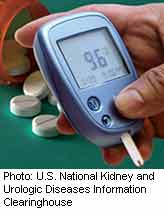- Could Your Grocery Store Meat Be Causing Recurring UTIs?
- Are You Making This Expensive Thermostat Error This Winter?
- Recognizing the Signs of Hypothyroidism
- 10 Strategies to Overcome Insomnia
- Could Artificial Sweeteners Be Aging the Brain Faster?
- Techniques for Soothing Your Nervous System
- Does the Water in Your House Smell Funny? Here’s Why
- Can a Daily Dose of Apple Cider Vinegar Actually Aid Weight Loss?
- 6 Health Beverages That Can Actually Spike Your Blood Sugar
- Treatment Options for Social Anxiety Disorder
Statins May Help Prevent Diabetes-Related Nerve Damage, Study Finds


Cholesterol-busting statins may also help prevent common and serious diabetes complications, a new study indicates.
Although the drugs are known to lower the risk for heart attack and stroke among those with type 2 diabetes, Danish researchers report statins may also help protect against diabetes-related damage to small blood vessels in the body that can lead to blindness and amputations.
The scientists noted that the results in the new research were unexpected.
“Since high levels of blood glucose, the hallmark of diabetes, are linked with microvascular disease, and since statins are suspected of raising glucose levels, we tested the hypothesis that individuals taking a statin before a diagnosis of diabetes might be at increased risk of developing microvascular complications,” study author Borge Nordestgaard, chief physician in clinical biochemistry at Copenhagen University Hospital in Denmark, explained in a news release. “Surprisingly, the results showed that statins decreased, rather than increased, risk of these complications.”
The research, published Sept. 9 in The Lancet Diabetes & Endocrinology, involved data from Danish clinical registries on more than 60,000 people with diabetes. The patients were aged 40 or older and were diagnosed with the disease between January 1996 and December 2009.
The researchers compared the outcomes of more than 15,500 patients who used statins to more than 47,000 patients who were not taking the drugs.
After a median follow-up of 2.7 years, the study showed that people who used statins were 34 percent less likely to be diagnosed with diabetes-related nerve damage and 40 percent less likely to develop diabetes-related damage to the retina. These patients also had a 12 percent lower risk of gangrene than those who did not take statins.
However, the researchers pointed out that the risk for kidney disease was no different between the patients who took statins and those who did not.
“We found no evidence that statin use is associated with an increased risk of microvascular disease. Whether or not statins are protective against some forms of microvascular disease — a possibility raised by these data — and by which mechanism, will need to be addressed in studies similar to ours,” study co-author Dr. Sune Nielsen said in the journal news release.
The author of a commentary that accompanied the study suggested a possible explanation for the finding.
“Statins also have anti-inflammatory effects, which might slow the progression of microvascular disease in the eye or kidney,” Dr. David Preiss, from the British Heart Foundation Cardiovascular Research Centre at the University of Glasgow, explained in the news release.
Another expert said the unexpected finding shows why such research is important.
“This just reaffirms that statins work through multiple complex mechanisms, and that it is important to do the study rather than to come to conclusions based on assumptions,” said Dr. Allison Reiss, head of Inflammation Laboratory at Winthrop-University Hospital in Mineola, N.Y. “It is also noteworthy that the population in Denmark is much more homogeneous than in other parts of the world, and results could be different if the population were more diverse.”
More information
The American Diabetes Association provides more information on diabetes complications.
Source: HealthDay
Copyright © 2026 HealthDay. All rights reserved.










